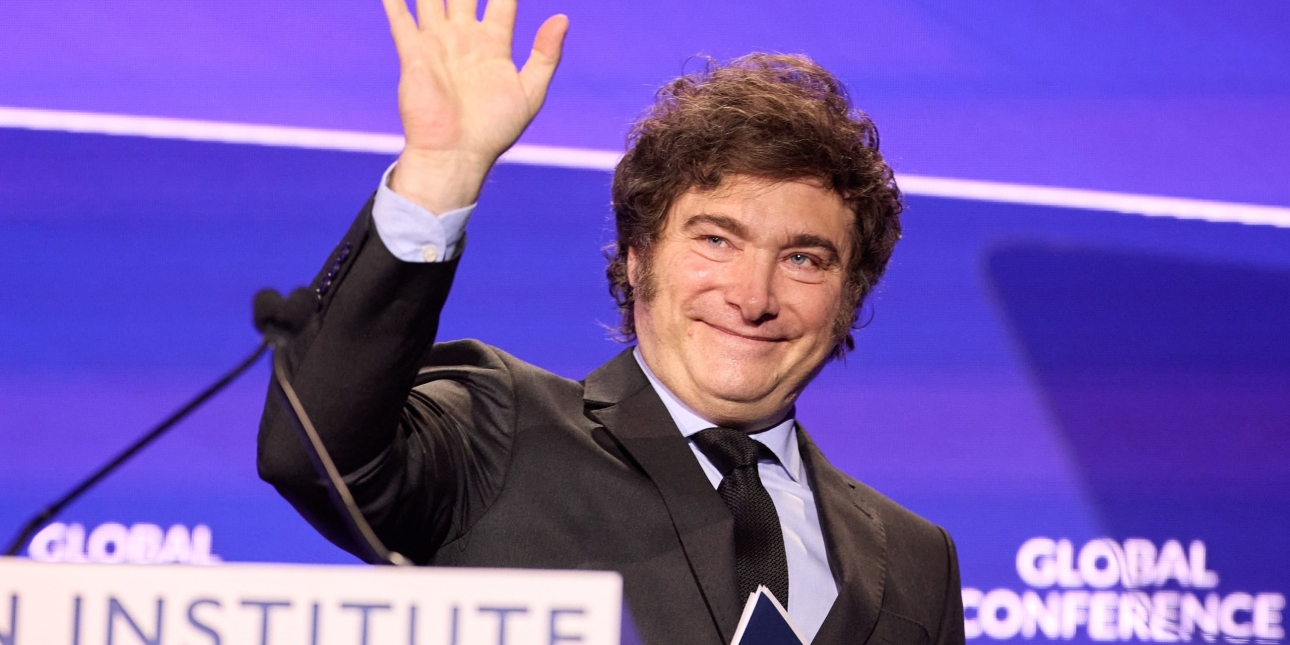Will Javier Milei rescue or ruin Argentina's economy?
The populist, right-wing, former HSBC economist swept to power last November – and the world is watching
He’s called the pope an “imbecile” and branded the president of neighbouring Colombia a “murdering terrorist.” He’s launched a thousand internet memes and raffled off his monthly salary after entering politics. Argentinian president Javier Milei is like nobody else in global politics: overseeing rapid inflation and yet becalming markets, slashing pensions and public spending while remaining just about popular enough.
Describing himself as an anarcho-capitalist, Milei’s rise to power is extraordinary – not least because like all good libertarians, the man seems to despise the state itself. But Argentina was ready for something new: decades of economic mismanagement and short-term fixes had left a basket case economy, with everything from emergency deals with the International Monetary Fund to the ‘blue dollar,’ an unofficial black market exchange rate that operates in plain sight. Milei – a former HSBC economist who became one of the country’s most prominent TV talking heads prior to jumping into politics – promised radical medicine to fix the patient.
That medicine includes radical spending cuts to produce a budget deficit – with the government spending less than it takes in. It also requires significant tweaks to the value of the currency which, while cheering the markets, pushed inflation up to a monthly rate north of 25%. The country’s business elites remain behind him. The risks are obvious, however: in Argentina’s seemingly unique economic pendulum, with the country swinging from leftist to rightist governments, there is always the risk that increasingly real-terms poverty and currency devaluations create conditions in which Milei, who lacks establishment support, will flounder.
Anti-establishment politics
For some analysts, the real test will be at the midterm elections in 2025. Milei has run an anti-establishment campaign for years: it is more difficult to do that when you are, in fact, in charge. The elections are for the senate, not for his role, but they will (as all midterms are) be seen as a referendum on whether his brand of tough medicine is starting to have an impact. If he fails, it is hard to see how an ambitious legislative programme which has already run into several hurdles will succeed.
It has been tempting for some to look at Milei’s ascension to power as being part of a wider populist push in global politics, driven by a combination of frustration at economic mobility and smart social media campaigning.
Milei is a populist, no doubt about that. But he’s at least a populist who seems to have the right instincts: he has been referred to on more than one occasion as Argentina’s answer to Donald Trump, but unlike the Republican nominee and former US president, Milei has been public in his support of Ukraine against Russia. Others have compared him to Jair Bolsonaro in Brazil, though again, the economic populism of Milei does not sit totally comfortably in comparison to the ex-Brazilian president’s social conservatism.
No, Milei is his own man. Which will hopefully give Argentina the shot in the arm it needs. One noted economist once said there were four kinds of countries: developed, developing, Japan, and Argentina. It wasn’t meant as a compliment. While nowhere in central or Latin America passes every investor check, it’s become apparent in recent years that investors and foreign corporates would rather be elsewhere in the region: as a note from Lloyds Bank rather diplomatically puts it, “economic insecurity and recurring crises hamper the task. The overall openness to foreign investment is below average.”
Milei talks, Davos listens
Milei has set about trying to change that, not just with his economic radicalism but with important signalling. A speech at Davos – hardly the stage populists usually enjoy – saw him extol the virtues of free-market capitalism in a way few world leaders or even economists would dare to.
“Today I’m here to tell you that the western world is in danger,” he began.
“And it is in danger because those who are supposed to have to defend the values of the west are co-opted by a vision of the world that inexorably leads to socialism and thereby to poverty.”
In the rest of the speech he described business leaders as “heroes,” slammed a “caste” of establishment figures – again, this was delivered at Davos – and told the world that his Argentina was a place where people could do business.
“Let no one tell you that your ambition is immoral,” he said to the globe’s corporate elites.
“If you make money, it’s because you offer a better product at a better price, thereby contributing to general wellbeing.”
Will it work? It’s certainly got City of London figures talking; Milei’s speech was passed around at least one WhatsApp group of City and tech leaders. One YouTube video of the address ("This speech just broke the internet") was watched by more than a million people in the space of a day.
But for all the noise, the real test will be Argentina’s economy – and whether the TV-friendly economist can become enough of a politician to retain his popularity while delivering painful reform.
Andy Silvester is editor of City AM.
Watch the BBC interview, broadcast earlier this month, in which Milei accepted that the Falkland Islands remain in the hands of the British – for now – and spoke of his admiration for the “brilliant” Margaret Thatcher.
.jpg&w=728&h=90&maxW=&maxH=&zc=1)

